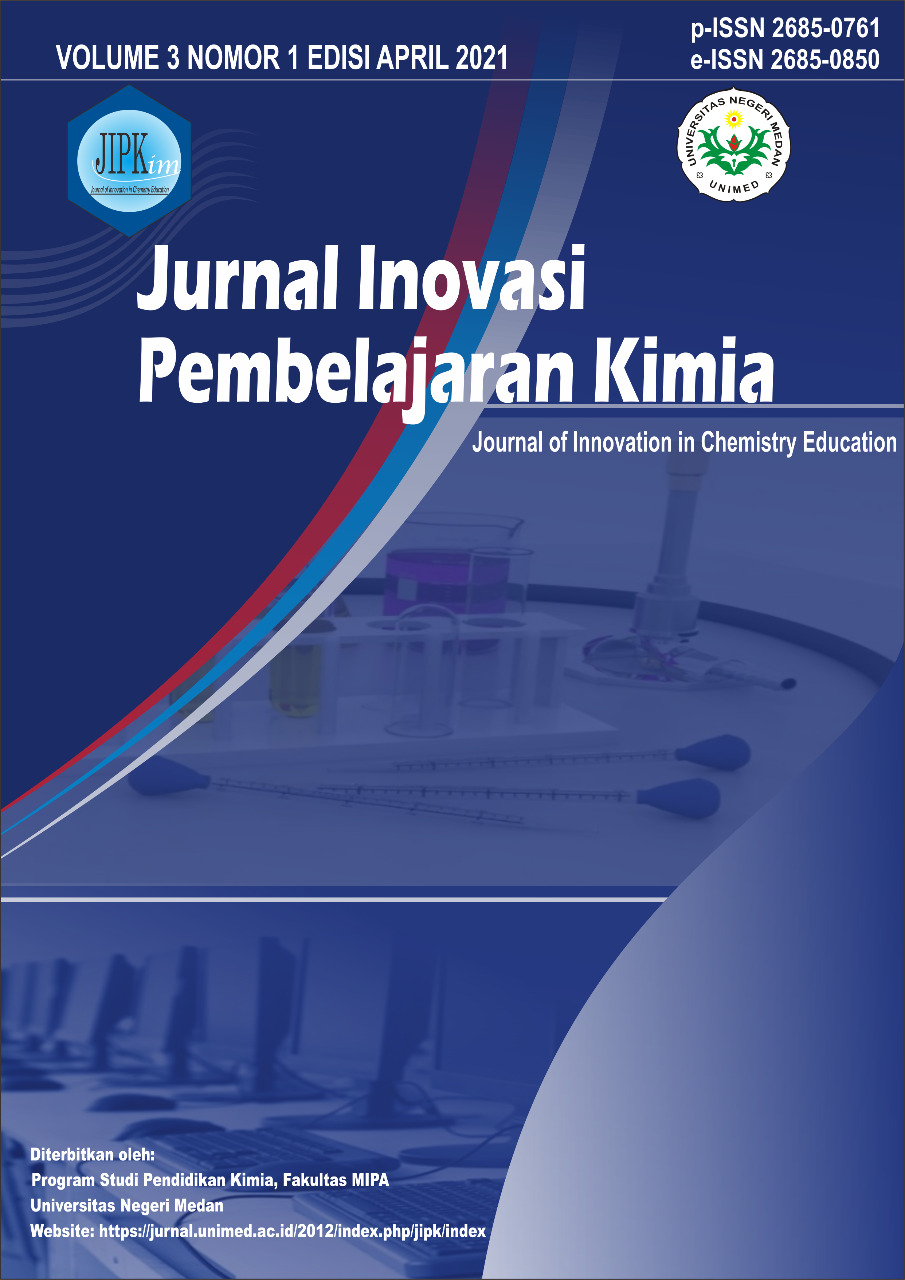Penerapan Model Pembelajaran Problem Solving untuk Meningkatkan Hasil Belajar Kimia Siswa Kelas XI SMA
DOI:
https://doi.org/10.24114/jipk.v3i1.24152Keywords:
Model Pembelajaran, Problem Solving, Hasil Belajar, PTKAbstract
This study aimed to determine the increase in student learning outcomes in the domain of knowledge, skills, and attitudes by using problem-solving learning models. The method used is classroom action research through two learning cycles consisting of the stages of planning, implementing, observing, and reflecting. There was an increase in learning outcomes and the number of students who met the minimum completeness in the domain of knowledge seen from the average value of students in cycle 1 to cycle 2. The learning outcomes of students in the domain of skills from the observation were included in the sufficient criteria in cycle 1 and increased to be good criteria in cycle 2. Classical completeness based on the number of students in cycle 1 to cycle 2 has increased. The learning outcomes of students in the domain of attitudes through the results of observation data were included in the sufficient criteria in cycle 1 and increased to be good criteria in cycle 2. As well as an increase in completeness seen from the number of students in cycle I to cycle II. Based on these findings, this model can be used to improve the chemistry learning outcomes of students in class XI.References
Arends, R. (2008). Learning To Teach. Pustaka Belajar.
Damopolii, I., Nunaki, J. H., & Supriyadi, G. (2018). Effect of Problem Solving Learning Model on Students Achievement. Journal of Education Research and Evaluation, 2(1), 1“9. https://doi.org/10.23887/jere.v2i1.12558
Darsono, M. (2000). Belajar dan Pembelajaran. IKIP Semarang Press.
Emaliana, I. (2017). Teacher-centered or Student-centered Learning Approach to Promote Learning ? Jurnal Sosial Humaniora, 10, 59“70. https://www.google.com/url?sa=t&rct=j&q=&esrc=s&source=web&cd=12&ved=2ahUKEwi02trB7KzkAhVM8HMBHUtbD5E4ChAWMAF6BAgEEAE&url=http%3A%2F%2Fiptek.its.ac.id%2Findex.php%2Fjsh%2Farticle%2Fdownload%2F2161%2F2425&usg=AOvVaw24xmdoNx1SXPXlyKtlTij7
Gunawan, G., & Asrifan, A. (2020). Penerapan Kerja Kelompok Kegiatan MGMP Guru Ekonomi dalam Menyusun RPP untuk Meningkatkan Kompetensi Pedagogik. Celebes Education Review, 2(1), 31“36. https://doi.org/10.37541/cer.v2i1.318
Ibrahim, M., Fida R., Mohammad N. (2000). Pembelajaran Berdasarkan Masalah. Unesa-University Press.
Ika, Y. E. (2018). Pembelajaran Berbasis Laboratorium IPA untuk Melatih Keterampilan Komunikasi Ilmiah Siswa SMP Kelas VII. JIPFRI (Jurnal Inovasi Pendidikan Fisika Dan Riset Ilmiah), 2(2), 101“113. https://doi.org/10.30599/jipfri.v2i2.338
Joyce, B., Weil, M., Calhoun, E. (2008). Models of Teaching (4th ed.). Prentice Hall.
Khairani, I., & Safitri, R. (2018). Penerapan Metode Pembelajaran Problem Solving Untuk Meningkatkan Hasil Belajar Peserta Didik Pada Materi Usaha Dan Energi Di Man Rukoh Banda Aceh. Jurnal Pendidikan Sains Indonesia, 5(2), 32“41. https://doi.org/10.24815/jpsi.v5i2.9814
Lie, A. (2002). Cooperative Learning. Grasindo.
Mulyasa. (2002). Kurikulum Berbasis Kompetensi. Rosdakarya.
Nasution, S. (2004). Berbagai Pendekatan dalam Proses Belajar Mengajar. Bumi Aksara.
Prihatiningsih, T. (2003). Pengembangan Instrumen Penilaian Biologi. Depdikbud.
Purwanto, N. (2002). Psikologi Belajar. IKIP Semarang Press.
Sani, R. A. (2012). Pengembangan Laboratorium Kimia. Unimed Press.
Soulisa, I. (2018). Penggunaan Bahasa Indonesia Lisan Baik Dan Benar Dalam Kelompok Kecil Kalangan Mahasiswa Prodi Bahasa Dan Sastra Indonesia Universitas Victory Sorong. KREDO : Jurnal Ilmiah Bahasa Dan Sastra, 2(1), 81“87. https://doi.org/10.24176/kredo.v2i1.2785
Sudjana, N. (2011). Dasar-Dasar Proses Belajar Mengajar. Sinar Baru Algesindo.

